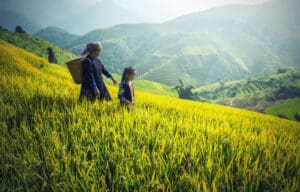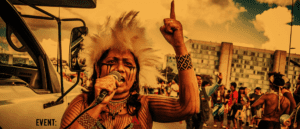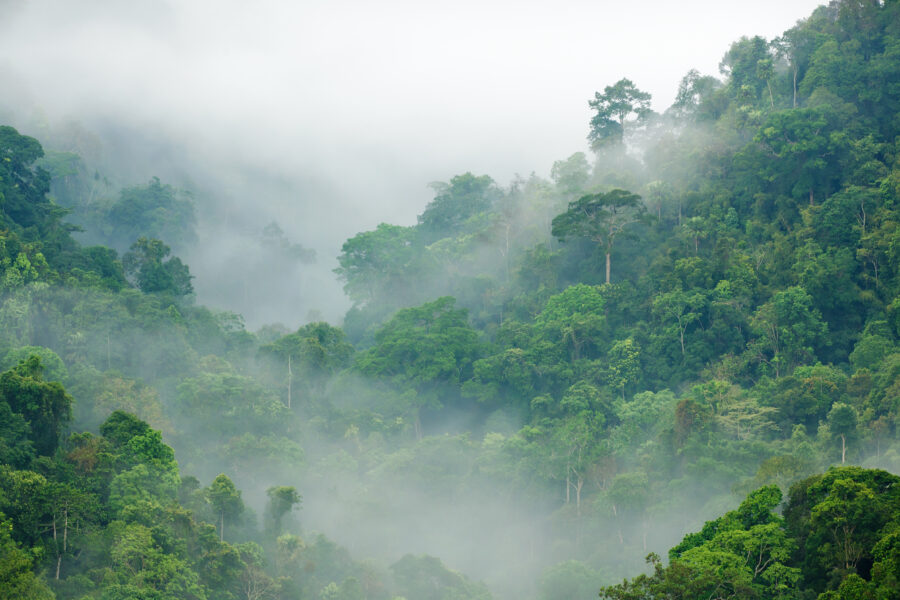The following is a Human Rights Emergency Declaration for Indigenous defenders of the Amazon written by COICA and endorsed by its member organizations. It is a call to action for governments of the nine Amazonian countries, international human rights organizations, and organizations and allies of human rights defenders including the United Nations (UN), the Inter-American Court of Human Rights (IACHR), and the Economic Commission for Latin America and the Caribbean (ECLAC).
A message from the Coordinator of the Indigenous Organizations of the Amazon Basin (COICA) and its member organizations from nine countries in the Amazon basin:
- AIDESEP, Interethnic Association for the Development of the Peruvian Rainforest
- APA, Amerindian Peoples Association for Guyana
- CIDOB, Confederation of Indigenous Peoples of Bolivia
- COIAB, Coordination of Indigenous Organizations of the Brazilian Amazon
- CONFENIAE, Confederation of Indigenous Nationalities of Ecuador
- OPIAC, Organization of Indigenous Peoples of the Colombian Amazon
- ORPIA, Regional Organization of Amazonian Indigenous Peoples (Venezuela)
- FOAG, Federation of Indigenous Organizations of Guyana
- OIS, Organization of Indigenous People in Suriname
The alarming and systematic murders of our Indigenous brothers and sisters in Amazonian countries demonstrates a clear violation of human rights which has been aggravated in the context of the COVID-19 pandemic. The strength and survival of Indigenous Peoples and the protection of the Amazon is being threatened.
WHEREAS:
In 2020, 263 murders of human rights defenders were recorded in Latin America, 202 (77%) of which occurred in countries in the Amazon Basin (Bolivia, Brazil, Colombia, and Peru).
Also in 2020, 69% of the murders were of leaders working to defend the environment and the rights and territories of Indigenous Peoples.
The first quarter of 2021 alone recorded 19 murders of Indigenous brothers and sisters (Colombia and Peru) who were defending the rights of Indigenous Peoples and Mother Nature.
Behind the murders of Indigenous Peoples advocating for human rights and Mother Nature, there are structural problems directly linked to the progress of extractive activities that align with the interests of corporations with state agreements that promote hydrocarbon extraction, indiscriminate mining, aggressive deforestation, drug trafficking, increased militarization, and the continuation of an armed conflict that has been diplomatically silenced, thus threatening the physical and cultural integrity of Indigenous Peoples, Afro-descendant Peoples, and local communities.
Since most of the murders have occurred as a result of defending territory and carrying out actions in favor of land titling, the lack of titling of Indigenous territories represents one of the greatest threats.
The Inter-American Court of Human Rights (IACHR) has established that this loss of leaders damages the social fabric of Indigenous Peoples and represents an expressed will to silence voices, thus disrupting the organization and organizational structure because it hinders the ability to express concerns about issues affecting communities.
The right to life is the most important human right since it is on the basis of this right that all other rights are realized. It is enshrined in Article 4 of the American Convention on Human Rights (ACHR), Article 6 of the International Covenant on Civil and Political Rights (ICCPR), and Article 3 of the Universal Declaration of Human Rights (UDHR). Thus, IACHR establishes that the right to life is a “fundamental human right, the enjoyment of which is a prerequisite for the enjoyment of all other human rights. If it is not respected, all rights are meaningless.”
In accordance with ILO Convention 169 on Indigenous and Tribal Peoples, Article 2 establishes that “governments, with the participation of the peoples concerned, shall assume the responsibility to develop coordinated and systematic action to protect the rights of these peoples and ensure respect for their integrity”.
In Article 7, the United Nations Declaration on the Rights of Indigenous Peoples (UNDRIP), states that “Indigenous individuals have the right to life, physical and mental integrity, liberty and security of person.” It further determines that “Indigenous Peoples, in exercising their right to self-determination, have the right to autonomy or self-government in matters relating to their internal and local affairs, as well as ways and means for financing their autonomous functions.”
COICA is an organization of international convergence representing more than 511 Indigenous Peoples (including 66 in a situation of isolation and initial contact) that focuses its efforts on the promotion, protection, and security of Indigenous territories in line with specific ways of life, principles, and social, spiritual, cultural, political, and economic values.
In view of the above, and in response to the evident human rights violations of the Indigenous Peoples in the Amazon basin, WE HEREBY RESOLVE TO:
- Declare a human rights emergency for Indigenous defenders in the Amazon.
- Strengthen COICA’s Program for the Defense of Indigenous Defenders through a roadmap jointly developed with partners and allies in order to prevent Indigenous leaders from being cannon fodder for extractivist repression, stop persecutions, protect families and communities, and develop legal, political, and judicial actions before national and international bodies against governments that destroy the Amazon and repress Indigenous Peoples, in compliance with the Macapá Mandate.
- Submit this Declaration to the competent international organizations and authorities.
WE HEREBY DEMAND that the governments of the 9 Amazonian countries:
- Adopt an effective policy for the protection of the human rights of Indigenous defenders in the Amazon while taking into consideration that they are in a highly vulnerable situation, especially in border sectors where they are exposed to systematic situations of abandonment and neglect by the state and are under serious pressure from armed actors desiring territory for extractive or forestry activities which can cause dispossession, a situation that could amount to genocide by omission.
- Carry out urgent investigations in coordination with different levels of government and respective Indigenous authorities regarding all illegal extractive activities reported in Indigenous territories as a means of effectively eradicating those activities.
- Guarantee the titling of Indigenous Peoples’ territories, including delimitation, demarcation, and regulation with the due participation of representative Indigenous organizations based on the right to consultation and free, prior, and informed consent (FPIC), as guaranteed in international instruments, which safeguards the survival of forests and cultures as well as curbs the destructive pressures of extractivism and cultural and social disintegration.
- Respect the process of autonomy and territorial self-government of the Indigenous Peoples of the Amazon Basin as an alternative that strengthens governance, thus guaranteeing individual and collective rights, avoiding aggressions in territories, and stopping harassment, persecution, criminalization, rape, and murder.
- Ratify and prioritize the implementation of the Escazú Agreement, which includes the provision to guarantee a safe and enabling environment in which individuals, groups, and organizations promoting and defending human rights in environmental matters can operate free from threats, restrictions, and insecurities.
In accordance with the international organizations’ functions and competencies, WE HEREBY DEMAND THAT:
- The IACHR, based on the data presented, make a statement and request information from the governments of countries in the Amazon Basin on the actions implemented for prevention, attention, and reparation for our Indigenous brothers and sisters who are victims of threats and assassinations for defending both territories and lives. We request that the United Nations present a follow-up report on the assassinations of Indigenous defenders in the Amazon Basin and formulate recommendations for the nine Amazon countries in order to prevent and redress violations of Indigenous Peoples’ rights.
- The United Nations Permanent Forum on Indigenous Issues (UNPFII) endorse this Declaration in its 20th session to be held from April 19 to 30, 2021, and initiate a process to design and adopt a general recommendation regarding Indigenous defenders, including preventative and supportive actions, specifically the titling of Indigenous territories as a mechanism to eradicate illegal activities.
- The Economic Commission for Latin America and the Caribbean (ECLAC), as technical secretariat and together with the governments in the region that are party to the Escazú Agreement, open COP negotiations for Escazú with the participation of Indigenous organizations, including delegates representing the Indigenous Peoples of the Amazon from the Agreement’s compliance and implementation committee.
Finally, WE CALL UPON international human rights organizations, as well as organizations and allies that defend the lives of defenders, to join us and implement an action plan in order to safeguard the lives of Indigenous leaders in the Amazon whose only objectives are to protect territory and preserve the world’s largest tropical forest for current and future generations.
It is time to stop hiding the blood and pain of Amazonian territories which bear the murders of our brothers and sisters in impunity, jeopardizing the survival of Indigenous Peoples.
¡Amazonía Viva, Humanidad Segura! Live Amazonia, Secure Humanity!
Quito, April 14, 2021
COICA Board of Directors
José Gregorio Díaz Mirabal, COICA General Coordinator
Tuntiak Katán Jua, COICA Vice General Coordinator
Elcio Da Silva Manchineri, Territories and Natural Resources Coordinator
Adolfo Chávez Beyuma, International Relations and Cooperation Coordinator
Tabea Casique Coronado, Education, Science and Technology Coordinator
Michael John McGarrell, Policy and Collective Rights Coordinator
Irvin Ray Harvey Ristie, Health and Communications Coordinator
Harol Rincón Ipuchima, Environment, Climate Change, and Biodiversity Coordinator
Claudette Labonté, Women and Family Coordinator
COICA Coordination Council
Marlon Richard Vargas, CONFENIAE President (Ecuador)
Tomas Candia, CIDOB President (Bolivia)
Lizardo Cauper, AIDESEP President (Perú)
Eligio Da Costa Evaristo, ORPIA President (Venezuela)
Julio Cesar López, OPIAC President (Colombia)
Sirito Yana Aloema, OIS President (Suriname)
Thomas Lemmel Benson, APA President (Guyana)
Francinara Soares, COIAB Coordinator (Brazil)
Oscar Daza Gutierrez, Human Rights and Peace Coordinator of OPIAC
For additional information on how to get involved and take action today, visit COICA Amazonía’s website (available in Spanish only).
Interested in receiving notifications about new blog posts? Subscribe to the RRI blog now to get new posts delivered right to your inbox.






